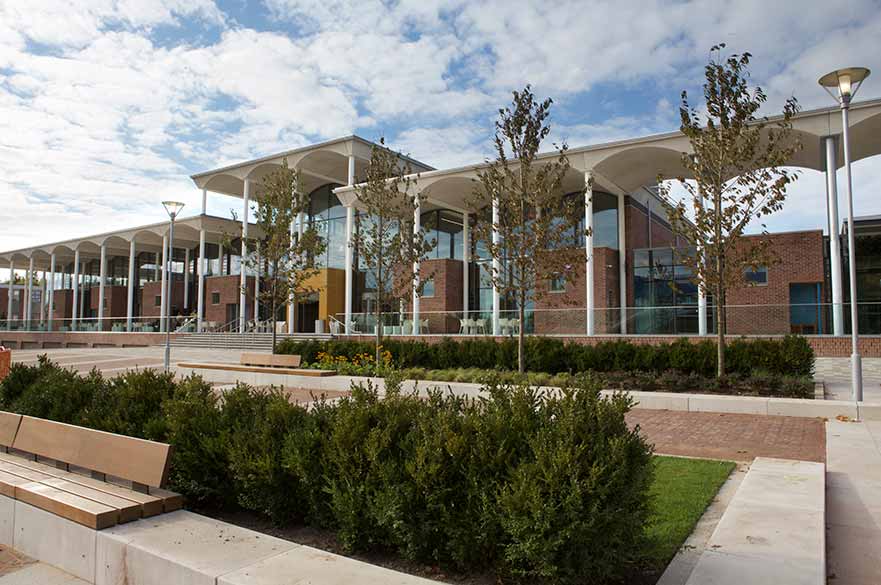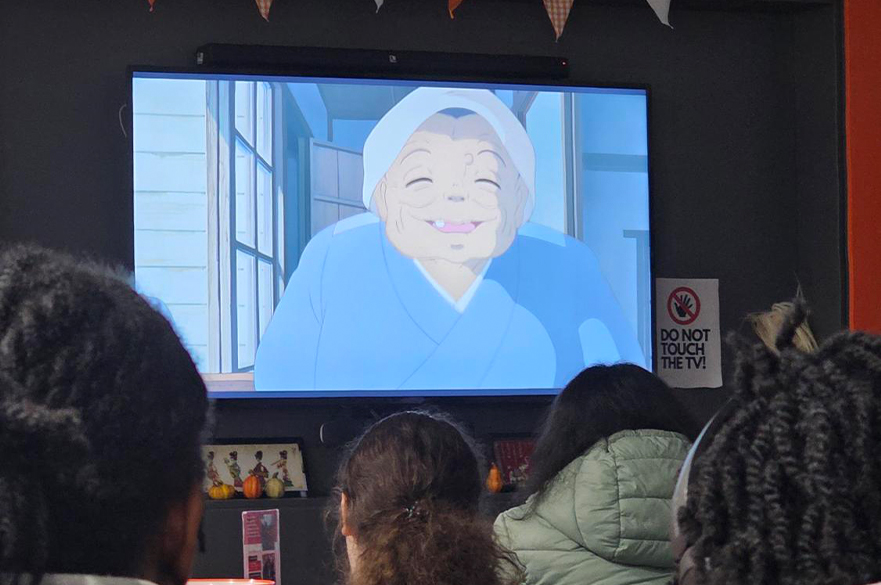Computing and Informatics Research and Industry Showcase 2024

The Computing and Informatics Research and Industry Showcase brings together the Department of Computer Science Industry Showcase and the Computing and Informatics Research Centre (CIRC) Research Centre Showcase for the first time, providing a platform for collaboration across many areas of our work.
- From: Monday 1 July 2024, 9.30 am
- To: Monday 1 July 2024, 4.30 pm
- Registration: 9.30 am
- Location: Teaching and Learning Building, Nottingham Trent University, Clifton Campus, Nottingham, NG11 8NS
- Booking deadline: Monday 1 July 2024, 5.00 pm
- Download this event to your calendar
Event details
Event date:
1 July 2024, 9:30 - 16:30.
The Computing and Informatics Research Centre (CIRC) is dedicated to "Enabling Digital Technology" through high-quality interdisciplinary work in advanced computer science topics. With strong links to both academia and industry, the CIRC is proud to present the first edition of the CIRC Research Showcase. This unique opportunity highlights the splendid work of CIRC members and their contributions to the field of digital technology. Through this showcase, the CIRC aims to demonstrate the breadth and diversity of research taking place within the centre and to inspire future collaborations.
The Research Showcase is a one-day event featuring several sub-events that highlight diverse research areas:
- Digital health
- Translation science
- Artificial intelligence AI integration
- Regulatory pathways in healthcare technology
- Influence of AI on healthcare adoption
- Ethics and safety in AI and synthetic intelligence
- Ethical considerations in AI development and deployment
- Safety implications of AI technologies
- Privacy concerns and algorithmic bias
- Promotion of transparency and accountability in AI applications
- Interdisciplinary collaboration for ethical AI governance
- Explainable AI in education and health
- VRET for public-speaking anxiety
- Integration of ML models with physiological data
- Biofeedback framework for psychological intervention
- Model selection and parameter tuning for arousal detection
- Potential applications in mental health treatments and beyond
- Behavioural Analysis for AI-assisted Decision-Making (BEHAVIOUR-AI)
- Utilisation of Intelligent Edge devices
- Integration of behavioural analysis with AI algorithms
- Applications in healthcare, agriculture/aquaculture, and environmental monitoring
- Personalised temperature regulation using Intelligent Edge devices
- Interdisciplinary collaboration for sustainable practices and ecosystem preservation
The Industry Showcase section is a collaborative event and will provide information and opportunities to:
- Find out about relevant Knowledge Exchange funding and how our staff may be able to work with you
- Find out how we can support your talent recruitment through placements, graduate recruitment and apprenticeships
- Help us to understand your needs as employers so that we can align our teaching to provide you with suitable graduates.
Discussions on the day will include:
- The use of generative AI (eg ChatGPT) within industry, and what knowledge and skills you expect our students to have
- The future of placements
- A framework for live projects
Registration
Programme
Introductory Sessions
| Time | Event | Location |
|---|---|---|
| 9:30 - 10:00 | Registration and Refreshments (available all day) | Teaching and Learning Building - Lecture Theatre 4 |
| 10:00 - 10:15 | Welcome and Introduction Prof Ahmad Lotfi and Prof David Brown | Teaching and Learning Building - Lecture Theatre 3 |
Industry Stream Schedule
See below for session descriptions, times and rooms.
| Time | Session | Location |
|---|---|---|
| 10:15 - 11:00 | Knowledge Exchange Enterprising Ashfield & Economic Programme Manager will explore collaborations with academics across schools, highlight recent business support projects funded by Nottingham City Councils' UK SPF allocation, and discuss how academic staff can assist your business. | Teaching and Learning Building - Lecture Theatre 2 |
| 11:00 - 11:15 | Comfort Break | |
| 11.15 - 12.30 | Talent Recruitment Join our Employability Team to explore support for placement and graduate recruitment, and learn from our Apprenticeships Team about Digital Apprenticeships in Computer Science as an alternative to traditional graduate hiring. | Teaching and Learning Building - Lecture Theatre 2 |
| 12:30 - 13:30 | Networking Lunch | Teaching and Learning Building - Lecture Theatre 4 |
| 13:30 - 14:00 | Poster Viewing, Facilities Tour, Hydra Demo | Teaching and Learning Building - Lecture Theatre 4 |
| 14:00 - 16:00 | Industry Liaison Forum Curriculum Discussion to include: Languages and Tools, Use of Chat GPT, Supporting Summer Placements, Management of Client Projects | Teaching and Learning Building - Lecture Theatre 2 |
| 16:00 - 16:10 | Closing Speech – Dr Beverley Cook | Teaching and Learning Building - Lecture Theatre 2 |
| 16:10 - 17:00 | Networking | Teaching and Learning Building - Lecture Theatre 4 |
Research Stream Schedule
See below for session descriptions, times and rooms.
| Time | Session | Session | Session | Session |
|---|---|---|---|---|
| 10:15 - 11:00 | Location: Teaching and Learning Building, Room P10 Digital Health, Translation Science and AI Chair: Dr Ayse Ulgen | Location: Teaching and Learning Building, Room P09 Explainable AI in Education and Health Chair: Prof David Brown | Location: Teaching and Learning Building, Room P11 Explainable AI in Education and Health Chair: Dr Farhad Fassihi Tash | ONLINE AQUABRAIN ICS: Underwater Species Behavioural Analysis Chair: Dr Pedro Machado |
| 11:00 - 11:15 | Comfort Break | |||
| 11:15 - 12:30 | Location: Teaching and Learning Building, Room P10 Digital Health, Translation Science and AI Chair: Dr Ayse | Location: Teaching and Learning Building, Room P09 Explainable AI in Education and Health Chair: Prof David Brown | Location: Teaching and Learning Building, Room P11 Explainable AI in Education and Health Chair: Dr Farhad Fassihi Tash | ONLINE AQUABRAIN ICS: Underwater Species Behavioural Analysis Chair: Dr Pedro Machado |
Continued (Research Stream Schedule)
| Time | Event | Location |
|---|---|---|
| 12:30 - 13:30 | Networking Lunch | Teaching and Learning Building - Lecture Theatre 4 |
| 13:30 - 14:00 | Poster Viewing, Facilities Tour, Hydra Demo | Teaching and Learning Building - Lecture Theatre 4 |
| 14:00 - 14:10 | Research @ NTU – Introduction Prof. David Brown | Teaching and Learning Building - Lecture Theatre 3 |
| 14:10 - 17:00 | Artificial Innovation: Augmenting Creative Design with AI Dr Farhad Fassihi Tash | Teaching and Learning Building, Room P11 |
| 14:10 - 14:30 | Research Strategy and Operations at NTU – how can we help you? Dr Rebecca Stokes | Teaching and Learning Building - Lecture Theatre 3 |
| 14:30 - 14:50 | Researchers need Users Michael Hibbert, James Jackson,Michelle CafferkyandDavid S. Stewart | Teaching and Learning Building - Lecture Theatre 3 |
| 14:50 - 15:10 | Comfort Break | - |
| 15:10 - 15:30 | Knowledge Exchange – Why Bother? Kelly Auty | Teaching and Learning Building - Lecture Theatre 3 |
| 15:30 - 15:50 | Research in the School of ARES Prof. Richard Yarnell | Teaching and Learning Building - Lecture Theatre 3 |
| 15:50 - 16:00 | Comfort Break | - |
| 16:00 - 16:50 | Discussion forum: Research at NTU Dr Pedro Machado | Teaching and Learning Building - Lecture Theatre 3 |
| 16:50 - 17:00 | Closing speech Prof David Brown | Teaching and Learning Building - Lecture Theatre 3 |
Venue
Teaching and Learning Building, Nottingham Trent University, Clifton Campus NG11 8NS
Poster submissions
All poster presenters are kindly requested to adhere to the poster guidelines provided by the NTU Doctoral School. These guidelines serve as a framework for creating and presenting posters at the event. By following these guidelines, presenters can ensure that their posters are visually appealing, well-structured, and effectively communicate their research findings. It is encouraged that presenters carefully review and implement the guidelines to enhance the overall quality and impact of their posters.
To streamline the submission process and ensure efficient management, all posters MUST be submitted through the Conference Management Toolkit. This toolkit serves as a centralised platform for collecting and organising abstracts, enabling easy access and effective coordination for the event organisers.
Deadline:
Contact
Morning sessions - description
The role of functional safety and risk for AI systems applied to healthcare
This session focuses on the convergence of digital health, translation science, and AI, highlighting their increasing importance in the healthcare sector. Peter Bannister, MD of Romilly Life Sciences, with a background in medical imaging and AI from Oxford, is a notable figure in this space. His expertise spans successful collaborations with industry giants like Siemens Healthineers and Rolls Royce Plc, as well as influential roles within prestigious organizations like the Academy of Medical Sciences and the Institution of Engineering and Technology. Bannister's work underscores the critical role of robust regulatory pathways and risk analysis in guiding the development and commercialization of AI-driven healthcare products, ensuring their safe and effective integration into clinical practice.
Explainable AI in Education and Health
Ethical and safety considerations inherent in the rapid evolution of artificial and synthetic intelligence (AI). Delving into the multifaceted dimensions of AI ethics, the presentation explores issues such as privacy concerns, algorithmic bias, and the potential for job displacement. Emphasizing the need for proactive measures to mitigate risks and promote transparency and accountability, the discussion underscores the importance of interdisciplinary collaboration and stakeholder engagement in shaping safe and ethical AI policies. The presentation advocates for the development of universal international standards and protocols to guide the responsible development and deployment of AI technologies, ensuring they align with fundamental values of fairness, equity, and human dignity.
Ethics and Safety in Artificial and Synthetic Intelligence
As technology developments in Artificial Intelligence (AI) advance at an unprecedented pace, they promise significant societal benefits. This affects every aspect of our day-to-day activities, from accessing healthcare, education management and delivery to how businesses are run. It is, important to recognise that with this power comes profound ethical responsibilities and safety concerns. Ensuring that AI systems are designed and deployed responsibly is not just a technical challenge but a moral imperative. In practice, we have standards that governs manufacture of man-made artefacts, yet there are no universally agreed principles that oversee the safety and ethics of AI solutions. This presentation explores ethical and safety protocols, and regulatory measures essential for guiding AI development in a way that safeguards humanity’s best interests and upholds our shared values.
AQUABRAIN ICS: Underwater Species Behavioural Analysis
Introduces the AQUABRAIN impact case, which centres on Behavioural Analysis for AI-assisted Decision-Making (BEHAVIOR-AI), grounded in research on Intelligent Edge devices. These devices, functioning autonomously without internet connectivity, leverage AI and Machine Learning algorithms to glean insights from behavioural data. The interdisciplinary research spearheaded by Dr. Pedro Machado and Dr. Isibor Kennedy Ihianle merges expertise in neuromorphic engineering, edge computing, and pervasive computing. This initiative extends its reach across sectors, notably in healthcare, agriculture/aquaculture, and environmental monitoring, aligning with Sustainable Development Goals. One significant application lies in personalized temperature regulation through Intelligent Edge devices, crucial for enhancing well-being and mitigating heat-related illnesses. As the event unfolds, there will be a focus on leveraging these insights to prepare and submit applications for Horizon and UKRI calls, harnessing the potential of this research to address pressing societal challenges while fostering sustainable practices and ecosystem preservation.
Research at NTU
Research at NTU event is a significant platform for researchers, Postgraduate Researchers (PGRs), Early Career Researchers (ECRs), and Research Groups to showcase their work. Specifically targeting PGRs in computer science, this symposium provides a valuable opportunity to present and discuss research findings.
Research at NTU
Recent developments in the field of AI, particularly the Generative AI has created the potential to disrupt business and industry. Failing to take advantage of the benefits of this revolution can be costly for business. This workshop has been designed to demonstrate the potential application of GenAI in the creative design process and new product development. The workshop has been supported by the generous support from Omnivati, a US-Australian company who have developed a digital tool to utilise Systematic Inventive Thinking (SIT) methodology and has interfaced the solution with ChatGPT and Dall-E to augment the creative design process. During this workshop, participants will be introduced to the basic concepts of SIT and the digital tool designed for this purpose. As part of this workshop, participants will be provided with free (time-limited) access to Omnivati software tool. A selection of projects undertaken by our PG students will then be introduced as use case scenario for practice. The idea for using use case scenarios is to demonstrate how creative ideas can be produced in unfamiliar domains when ideation is supported through Gen AI. It is anticipated that this should provide a benchmark for effectiveness of the Generative AI in the participants’ business domain.
Research at NTU - Afternoon sessions – Abstracts and Biographies
Research in the School of Animal, Rural and Environmental Sciences (Dr Richard Yarnell)
Abstract: Research ARES is united under an overarching university Sustainable Futures research theme and encompasses environmental and ecosystem sustainability, sustainable use of resources, and sustainable production of food. We also deliver excellence in research through international and interdisciplinary collaboration and foster an environment that rewards innovation and the generation of new ideas. Research is conducted in four main subject areas of 1) natural environment, 2) ecology and conservation, 3) sustainable agriculture and food security and 4) animal health. A summary of the research in this area will be provided with a focus on how researchers are currently using digital technology to enhance their work, and hopefully inspire future collaborations.
Short bio: Richard is an Associate Professor in Ecology in the School of Animal, Rural and Environmental Sciences. His principal duties involve teaching and research, as well as conducting Academic Leadership and Management roles in the school. He is the Director of Doctoral Programmes, Chair the School Research Degrees Committee, and currently Acting Associate Dean for Research (ADR). His research focuses on understanding the ecological consequences of anthropogenic environmental change on vertebrates to inform current and future conservation management. Current projects include working as co-lead on the first National UK Mammal Monitoring programme, which is a pilot study into the long-term feasibility of using camera traps to monitor the UK’s mammals. Richard holds a number of external positions, including being a member of the International Union for the Conservation of Nature’s (IUCN) Hyaena Species Specialist Group, Associate Editor for the African Journal of Ecology, and a member of the NERC (Natural Environment Research Council) peer-review college.
Knowledge Exchange – Why bother? (Kelly Auty)
Abstract: The advantage of knowledge exchange and engaged approaches to the industries and communities Universities work with is well documented. Whether through the REF databases of thousands of impact case studies or through the reporting on economic and voluntary programmes that Universities run, there is considerable evidence across the sector of demonstrable benefits to our external partners, collaborators and stakeholders. But why should you, as an individual researcher, bother investing your time and energy into developing, nurturing and growing relationships through knowledge exchange? In this 15 minute presentation, I will explore what knowledge exchange is, what’s in it for you and signpost support available at NTU to help you do it well.
Short bio: Kelly is Head of Knowledge Exchange Development & Evaluation at NTU, where she leads the Institute for Knowledge Exchange Practice. With 20 years’ experience in policy and public engagement, she excels in translating research to non-academic audiences for impact. Kelly specialises in evaluation and has developed and led research impact strategies in several institutions, including for the 2021REF. As a qualified MSP practitioner, an academician of the National Co-ordinating Centre for Public Engagement in Higher Education and with an MSc in Science and Society, Kelly has a unique background in programme planning, management, delivery and evaluation through a knowledge exchange lens.
Researchers need Users
Abstract: This talk will cover the case for why it is important for computer science researchers to talk to end users. The 'NICER' group was set up in 1995 and is formed of young adults with learning disabilities. It acts as a research governance group and is involved in the co-design and evaluation of enabling technologies. Members of the group will pose challenging questions, such as: "who is the research really for?", and "does it just benefit academics who leave soon after they have the research results they need?". In addition to the impact of their research over the years, the presenters from the NICER group will talk about how their participation in co-research has made a difference, including in current projects combining immersive technologies and brain informatics to understand mild neurocognitive declines in adults with learning disabilities.
Short bio: Michael Hibbert, James Jackson and Michelle Cafferky (Members of the NICER Group ) supported by David S. Stewart - the Facilitator of the NICER Group.
Location details
Address:
Nottingham Trent University
Clifton Campus
Nottingham
NG11 8NS


